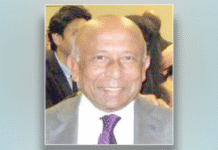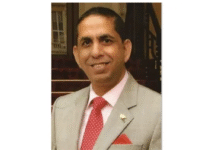By Arul Louis*
Donald Trump, a flamboyant real estate developer, TV personality and a flame-throwing populist has emerged as the front-runner for the Republican Party presidential nomination by mining a vein of deep insecurities in America’s silent majority.
He has scored points among a wide swath of Americans with his attacks on China – which he has denounced as an “enemy” – Mexico, South Korea, Japan and Saudi Arabia. But India, where he is involved in two real estate projects in Mumbai and Pune, has been spared his ire, even when he talks about jobs going overseas and about immigration.
He has praised Prime Minister Narendra Modi. “The perception about India has changed with Modi at the helm,” Trump told reporters during a business trip to India last year. “The optimism is returning.” He added that Modi “has done a fantastic job of bringing people together.”
Pakistan has not figured in Trump’s statements lately, but he is the only candidate so far to have raised red flags over Islamabad’s nuclear arsenal. In 2011 when he took a stab at the presidential run, he had called for de-nuclearising Pakistan. “I would say we don’t give them any money unless they get rid of their nuclear weapons,” he told Fox News. “Very much like China, these are not friends of ours.”
Trump said that he had predicted that Islamist terror chief Osama bin Laden would be found in Pakistan. There were more terrorists there, he said. “We have to go get the terrorists.” While he has not specified how he would do it, his nemesis President Barack Obama has been trying it with drones.
While he doesn’t formally have foreign policy or strategy advisers, he mentioned two hawks as people he likes: Former US ambassador the UN John Bolton and Jack Jacobs, a retired colonel who is a military analyst for NBC. Along with Trump’s interviews and writings going back four years, a look at what the two have said gives an idea of how he looks at South Asia.
The US presidential elections are more than a year away and Trump, whose focus is on foreign and immigration policy, is leading in the latest opinion poll by Fox News for the presidential nomination. He has a 25 percent support, ahead of the closest of 16 rivals, Jeb Bush, who has just 9 percent. And if Trump were to face Democrat Hillary Clinton in an election now, he would be just 5 percentage point behind her 47 percent.
Trump’s steadfast lead in the GOP polls confounds the pundits. He is not a professional politician and he wears that as a badge of honor. A proud billionaire who boasts of his riches, he has taken his companies through bankruptcies. He is intemperate in his speech, sometimes sounding like Silvio Berlusconi, a media mogul who was Italy’s prime minister, insulting and provocative by turn. He persists in his claim that Obama wasn’t born in the US and insults women who cross his path with vulgarities. Yet he is an American hero to many.
He has not always hewed to the Republican Party line. He has in the past supported universal health insurance and has said he opposed the Iraq war, but would now dedicate ground troops to fight the Islamic state. And some of his policy pronouncements sound off the wall, like his proposal for building The Great Wall of America to keep out illegal immigrants streaming in through Mexico.
To understand him in an Indian political context, imagine a character cloned from the flamboyant liquor and airline mogul in financial straits, Vijay Mallya,in his heyday, the provocative Hindu right-wing leader Pravin Togadia and maverick politician Arvind Kejriwal, who is now Delhi’s chief minister. Now imagine this persona to be five times as intense as the three of them. Place him in a nation feeling deeply troubled for reasons difficult to pin down amid an economic recovery — recent Reuters-Ipsos poll found that 58 percent of the people thought America was on the “wrong track” and only 27 percent that it was headed the right way.
Sounding naïve like Mr. Everyman, he has confessed that he gets his military advice from watching TV shows. “I watch the (TV news) shows. I mean, I really see a lot of great — you know, when you watch your show and all of the other shows,” he said.
One aspect of his foreign policy – the isolationism he advocates – can be summed up as no free lunches for anyone in order to save tax dollars. In his recent ‘Meet The Press’ interview on NBC, he said he would make the Saudis and the South Koreans pay the US defending them and he would give up on NATO, implying he would leave it to the Germans.
While his policies may seem muddled – even addled – he is crazy as a fox in his pragmatism. Take his stance on Iran. He denounced the recent multinational agreement with Iran on curbing its nuclear arms development. “They are going to have nuclear weapons,” he said. “They are going to take over parts of the world that you wouldn’t believe.” Yet, he wouldn’t “rip up” the agreement “because I’m a deal person,” said the author of “The Art of the Deal,” an autobiographical self-help book. “But I will police that deal.” He likened it to bad business contracts that he buys up and enforces to his advantage. For some of his seeming outlandish statements, he is coming up with similar bypasses.
Of the two foreign policy guides Trump has mentioned, Bolton, whom Trump described as a “tough cookie,” has in the past been hostile to India but seems to have tempered his views since Modi’s election. He has opposed President Barack Obama’s endorsement of India for a permanent seat in the UN Security Council and was reportedly against former President George W. Bush’s nuclear deal with India.
In a Wall Street Journal interview soon after Modi’s election last year, he recalled the US “working closely” with the ‘Atal Behari Vajpayee’s BJP-led government’. He said he saw prospects for strategic cooperation with on China. “Certainly China’s military activities in the south china sea, the east china sea, are going to concern India,” he said. “India’s new growth pattern if Modi’s policies succeed it will certainly boost India’s military capabilities as well, and so the two Asian giants facing each other is going to be a real issue for the rest of the century and an issue in which the United States has a real stake.”
Bolton said that the US, starting with Bush had effectively delinked India and Pakistan in its foreign policy. “It’s not a pivot to Asia,” he said. “If anything it’s a pivot to South Asia. The United States has to pay more attention to India.”
On Pakistan, Bolton shares Trumps concerns over nuclear weapons, which “could really ruin your day if it got into the wrong hands,” he said in a 2013 Fox TV interview. But unlike Trump, Bolton wanted the US to maintain close ties to the Pakistani and continue providing aid precisely to prevent jihadis taking over. He also said Islamabad was divided on jihadis with some supporting them against India.
Jacob has expressed scepticism on the efficacy aid to Pakistan and on its use of jihadis as a tool against India.
The outward looking aspect of Trump’s foreign policy centers on declaring a virtual trade war on China, Japan and Mexico, which he blames for loss of US jobs. In a book published in 2011, Trump had called China an “enemy” who “are hell bent on bankrupting our nation, stealing our jobs, who spy on us to steal our technology, who are undermining our currency, and who are ruining our way of life.”
In the NBC program, he asserted in a hyperbole that Mexico is the new China because of the falling peso that he tied to recent yuan devaluations. He would also make Mexico pay for sending illegal immigrants to the US and make it pay for The Great Wall of America through taxes and tariffs.
The magic of his appeal is primarily because of his hard stance on immigration and the loss of jobs abroad. On immigration, his position paper calls for raising the minimum wage for H1-B visas and requiring labor department certification that qualified citizens or immigrants aren’t available for the job. About 65 percent of all H1-B visas go to Indians and ComputerWorld reported that 86 percent of the visas in technology field are taken by Indians.
“Raising the prevailing wage paid to H-1Bs will force companies to give these coveted entry-level jobs to the existing domestic pool of unemployed native and immigrant workers in the U.S., instead of flying in cheaper workers from overseas,” the position paper said.
Pushing his populist agenda, and this time with a gesture to African-Americans, Latinos and women who consider him unfriendly, it added, “This will improve the number of black, Hispanic and female workers in Silicon Valley who have been passed over in favor of the H-1B program.”
The visa restrictions Trump proposes would seriously hit Indians and Indian tech industry that relies on providing consultants to US firms.
His position paper also calls for limiting green cards – or permanent immigration status – to foreign workers. “Before any new green cards are issued to foreign workers abroad, there will be a pause where employers will have to hire from the domestic pool of unemployed immigrant and native workers,” it said.
He has called for wholesale deportation of illegal immigrants, wanting to expel every one of them. But he has also has moderated his stand somewhat. He said in his NBC interview that while he was steadfast about deporting illegal immigrants, he will also expedite the immigration process “so people can come back in” – presumably those without criminal records and who meet certain criteria. He did not say how it can be done.
Pew Research Center estimates that there are 450,000 illegal immigrants from India in the US. Trump’s appeal on immigration – which is broadly charaterised in the media as anti-immigrant – comes from his focus on criminal illegal immigrants that then extend in perceptions to all immigrants. His opponents on immigration have failed to differentiate between criminal immigrants and law-abiding immigrants in their advocacy that extends to criminals facing deportation. (Trump is himself married to a Slovenian immigrant, a model who is 24 years his junior.
South Carolina’s Indian American Governor Nikki Haley is among those who have criticised Trump’s angry rhetoric and been attacked for it by the extreme right. Calling for civility in the campaign, she said, “He’s creating a very combative tone. Every day I feel like I’m hearing Mr. Trump attack another person personally.” “It’s not what we are looking for in a president.,” she added. “We are looking for someone who brings people together.”
*Arul Louis, a New York-based journalist and analyst, is a Senior Fellow of the Society for Policy Studies. He can be reached at arullouis@spsindia.in










